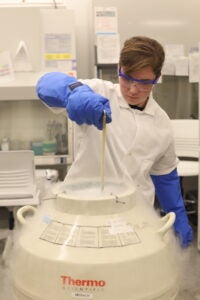The Chemical Engineering PhD program at the University of Rhode Island aims to develop each student’s ability to conduct independent creative scientific research.
Faculty are invested in success and considerable financial support is available for eligible scholars through graduate assistantship programs. Some areas of funded research currently underway:
Developing new ways to detect and treat human disease
Advanced drug delivery and formulation (Andreu, Bothun, Meenach, Menon)
In vivo and wearable nanosensors (Roxbury)
Engineering better everyday materials, like cosmetics or batteries
Soft matter, colloids, and interfaces (Bose, Bothun, Poling-Skutvik)
Energy storage (Bose)
Creating more responsive tech to detect pollutants in marine and terrestrial environments
Nanoenabled biological and environmental sensors (Bothun, Gregory, Roxbury)
Detecting trace components, like explosives, in the vapor phase
Materials, sensors, and coatings in extreme environments (Gregory)
Understanding how molecules of real-world fluids, like asphalt or biological systems, interact
Simulation of polymers, fluids, and bioprocesses (Greenfield, Lucia)
Program Requirements
 Candidate’s program will be determined in consultation with his or her committee and will be based on his or her background and career goals, and must include at least one course each in CHE applications (503), CHE thermodynamics (513, 614), CHE transport (541), and CHE research methods (570) at URI. Students with a masters degree require CHE 501, 502, 699 (25 credits) and fifteen credits of course work beyond the MS. Students with a bachelors degree require a qualifying exam, CHE 501, 502, 699 (37 credits), and 33 credits of course work. A comprehensive examination and an acceptable dissertation are required of all students to complete the program. Attendance in CHE 501 or 502 is required every semester for all on-campus students. Off-campus students can replace 501 and 502 with additional 691, 692, or 699 credits.
Candidate’s program will be determined in consultation with his or her committee and will be based on his or her background and career goals, and must include at least one course each in CHE applications (503), CHE thermodynamics (513, 614), CHE transport (541), and CHE research methods (570) at URI. Students with a masters degree require CHE 501, 502, 699 (25 credits) and fifteen credits of course work beyond the MS. Students with a bachelors degree require a qualifying exam, CHE 501, 502, 699 (37 credits), and 33 credits of course work. A comprehensive examination and an acceptable dissertation are required of all students to complete the program. Attendance in CHE 501 or 502 is required every semester for all on-campus students. Off-campus students can replace 501 and 502 with additional 691, 692, or 699 credits.
See the Chemical Engineering section of the URI Catalog for official details.
Areas of research concentration include:
- Biochemical Engineering
- Bionanotechnology
- Energy Engineering
- Environmental Engineering
- Materials Engineering
- Pharmaceutical Engineering
- Polymer Engineering
- Process Simulation
- Surface, Interfacial & Colloidal Phenomena
Admission Requirements
The Ph.D. requires a bachelor’s or master’s degree in chemical engineering; candidates from other engineering fields or from mathematics, biology, chemistry, or physics may be accepted into the program with possible addition of prerequisite courses.
